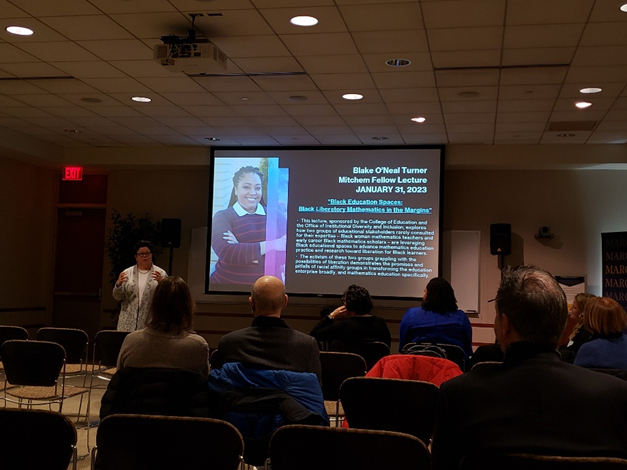
Blake O’Neal Turner, Marquette’s 2022-23 Mitchem Fellow, is working to disrupt the racial inequities that are prevalent in the field of mathematics.
When she first got into graduate school she was focused on culturally responsive teaching and cultural sustaining pedagogy. One day, as she was engaging with these topics, she came across the phrase, “Mathematics is not racially gender-neutral.”
Turner asked herself, “What does that mean? What would this mean for a math teacher who has been trained in very traditional mathematical spaces?”
As she continued to conduct more research within the context of the United States, it became clear to her that the United States’ educational system has a side of anti-Black sentiment. Through her research, she says she began to find ways to disrupt and dismantle whiteness and anti-blackness within mathematical spaces.
Turner has continued to pursue her research interests through the support of the Arnold L. Mitchem Dissertation Fellowship Program. Marquette created the Mitchem Fellowship with the intention of supporting minoritized doctoral candidates while they work to finish their Ph.D. The fellowship offers several benefits, including being on campus at Marquette for an academic year and teaching a course that is connected to their research. Turner is using this time to complete her dissertation entitled “Black Education Spaces: Black Liberatory Mathematics in the Margins.”
Turner says, “We still must prove that mathematics is not an equitable space. Many people say that mathematics is universal.” Turner sees that mathematics is not universal as there are various obstacles that hinder equitable access to mathematical content.
Not too long ago, Turner attended a conference in which the presenter stated, “Some people teach math, and some people teach people, and you have to choose which one.”
In response, Turner says, “We are teaching people who are impacted by socio-political and socio-historical things that are happening in our country and we have to take those into account as educators and practitioners.”
This has pushed her to look at best practices that can be implemented in the classroom. Some of her work has focused on working with teachers and students of color.

Through her research, she has seen that students do not find mathematics to be liberating. Turner states, “We do not provide kids with the opportunity to dream big in math like we do in English, art and history classes.”
She points out that the curriculum needs to be co-created with students, family and teachers while recognizing the diversity of each person. She notes a curriculum cannot be one-size-fits-all as students themselves are not one-size-fits-all. Students come from different backgrounds with different experiences to share.
Ultimately, Turner believes that one of the most important changes that must happen in the classroom is for teachers to listen to students. To better serve the needs of the students and have them become reengaged with the subject, they must be heard.
When speaking of the importance of the Mitchem Fellowship, Turner sees it as an essential program for support for aspiring Black and Brown faculty. During her time as a Mitchem Fellow, Turner has found great value in the mentorship received from other faculty.
“Based on my research of Black graduate students, we see that they often don’t have this type of support, so it is important that programs like the Arnold L. Mitchem Dissertation Fellowship be able to provide this support to underrepresented graduate students,” says Turner.
For Turner, Marquette has been a supportive place for her research. Specifically, the College of Education has been a place in which challenging and important conversations are being had and that encouraged her to apply for a tenured track position within the Department of Educational Policy and Leadership.
The College of Education will now have a familiar face in the fall of 2023 as Turner was offered and has accepted the position.


